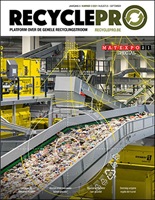The circular economy really has to move up a gear now
03 September 2021

Mark Thys, Managing Director Renewi Belgium
Taking your foot off the brake, shifting up a gear and accelerating. Maybe even change the shoulder of the gun to slow down the climate change that suddenly came very close last month. It is no coincidence that I draw many metaphors and jargon from the automotive world. As a 'newcomer' to the sector, after 20 years in the automotive industry, I am pleasantly surprised by the dynamics of the waste management industry. But above all, I feel responsible because together we can make a difference in the sector, be part of the solutions. If only we can shift up a gear.
The speed (of change) is essential
2021 is a summer of natural disasters. For a long time, natural disasters seemed something for television: reality on other continents or the script of an exciting film. But with the flooding in Belgium and neighbouring countries or the forest fires in Southern Europe, the urgency of the European Green Deal is more than apparent. That it is five minutes to midnight to tackle the climate emergency.
It is clear now. It will take more than a quick prayer to limit global warming to 2 degrees Celsius. The global climate plans that came about through the Paris Climate Agreement are expected to contribute a maximum of 15% to this target reduction. The circular economy can contribute to the remaining 85%. If governments, industry and other key players take the initiative to scale up from the current circularity (only 8.6%) to 17% in 2032, we will close the gap and limit global warming to less than 2 degrees in 2050. The transition to a circular economy must happen quickly.
Recycling is the engine
A sustainable transition is achievable through a combination of drastic reductions in the use of primary raw materials, eco-design, recycling and the creation of secondary raw materials from waste streams. Too often, and unjustly, recycling is relegated to the background when it comes to the circular economy. Recycling is more than the last option for a product. Of course, products must first be repaired and reused, but there will always come a time when a material is given a second life. Keeping materials in the cycle is the missing link in achieving the global climate ambitions. Isn't it simple? Consider our products and materials as temporary storage of raw materials. This way, we kill the proverbial two birds with one stone: on the one hand, we limit the extraction of scarce primary raw materials and, on the other hand, we give those that have already been extracted a second life instead of burning them. Recycling, therefore, plays a crucial role not only in creating secondary raw materials, but also in producing high-quality alternatives to increasingly scarce materials. By not dumping or burning waste, we keep valuable materials in the product value cycle. Otherwise, materials are lost and we create unnecessary CO2.
Pole position
A transition from linear processes to a circular economy requires behavioural changes from each of us, organisations and governments, and not least from purpose- and innovation-driven market leaders in the waste-to-product industry.
Flanders wants to and can be an international spearhead for recycling and secondary materials. VLAREMA 8 bears witness to this. But more is needed. I am therefore reaching out to colleagues, potential partners and the government to ensure that this ambitious legislation does not become a dead letter.
Let us make full use of our privileged pole position to win this race against the clock. And above all, take that foot off the brake and put it on the accelerator!
Read the full interview in recyclepro.be magazine here (Dutch):


